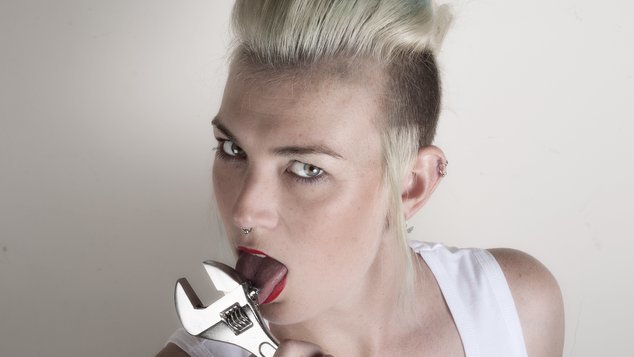
Gender Spanner | The Ellington | Til Feb 20 | ★ ★ ★ 1/2
Last year I made my own Fringe World debut by presenting a work that had a lot of pain in it. The stage is a cathartic space, and the move to use the stage in such a manner was audacious and foolhardy. When the reviews hit, they hit hard: from commending, to articulately constructive to outright condemning. I feel as though Gender Spanner comes from a similar space of cathartic release and that, as such, the audience reactions will span the same gamut. And that’s a good thing – it means the work challenges. Which is what Gender Spanner does on some level: witnessing a person open up their heart to share a moment of pain can be, for the lesser enlightened, a challenging thing to behold.
This show is a queer cavalcade of burlesque, poetry, cabaret, circus fun and gender fluidity. It follows the ups and downs of Jessica McKerlie as they examine the labels that stick and the labels that don’t, what it means to be a man, or a woman, or both, or neither. As we hit the new Gender Revolution, it’s no surprise seeing works like these hitting our stages, tackling the notions of the performative through performance, as it should be tackled. And while McKerlie’s hits sometimes miss, there is an undeniable magical sadness that transmutes into a haunting in this show.
McKerlie shines brightest when armed with a ukulele. I personally loathed this instrument prior to this show, but McKerlie uses it to great effect as an accompaniment that resonates and bolsters their beautifully boyish voice to new heights. It also becomes the perfect vehicle through which McKerlie sharpens their sad heart: there is a point where, frocked out in frocking middle class housewife attire, they deliver an aching song about the changes we go through that is very very touching.
In the last half, this romantic yearning is amped up. Their song about a former lover called Gabriel is a deliciously hurt song that explores being burnt by the cruelty of time and how it never gives us enough itself, particularly in affairs of the heart. It’s here that McKerlie stands proudest, vulnerable and open and aching and full of joyous lament. The pain is palatable, and so richly welcome in a reviewer such as myself who realizes that Fringe works should take us to the fringes of human experience – the darkest perversions, the most outrageous laughs and those moments of humanity that hurt inexplicably.
Admittedly this work does need a little work. It could be tightened in places, with the outrageousness made even more outrageous. I felt the circus elements were slightly underplayed and could have been amped up. If you’re going to have a splatter zone, then splatter the fuck out of the audience. Shock them senseless. Leave them soiled. Do it! And I know McKerlie can – there is an anarchist punk rock sensibility in their swagger that they just need to unleash… even if it results in having to foot a damage bill (maybe not, but yeah, maybe maybe). Also, their characterization could be more lurid and sensual in the early half, audacious like the striptease at the end was titillating, literally.
But that said, the highlight came at the show’s close, with McKerlie cleverly mashing Miley Cyrus with an LGBTIQA anthem that, quite literally, brought a tear to my eye. Not just because of the aching sincerity, but because of their wonderful use of audience interaction and personal insight. The overall effect made this show well worth seeing, and even now as I write, the vulnerability they displayed is still palatable, and welcome, and slightly tear inducing. My god…they certainly have thrown a spanner in my works.
I would recommend seeing this show, if more than anything for the simple fact of supporting queer creative talent. And as mentioned earlier, it might leave some commending it, others articulately critical yet supportive, and be an outright affront or bore to others. But more than anything, if you let yourself open your heart and realize that this is a genuine human experience taking place – and excuse the ramshackle early half elements – then you’ll be rewarded. Maybe with laughs, maybe a slight chuckle, but maybe… just maybe… they’ll touch you like they touched me. Not inappropriately, but rather with a humanity that – once the labels fall away – leaves you realizing that the performative notion of gender can be a lovely chaos of mixed emotions, but touching none the less.
Scott-Patrick Mitchell





